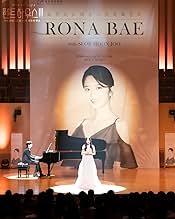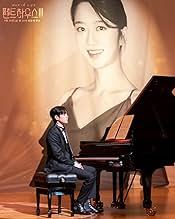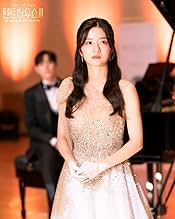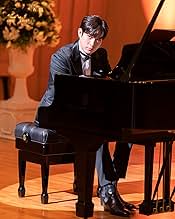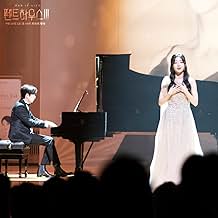हेरा पैलेस में रह रहे अमीर परिवारों और उनके बच्चों की कहानियों को दर्शाया गया है, जो अपने मकसद के लिए किसी भी हद तक जा सकते हैं.हेरा पैलेस में रह रहे अमीर परिवारों और उनके बच्चों की कहानियों को दर्शाया गया है, जो अपने मकसद के लिए किसी भी हद तक जा सकते हैं.हेरा पैलेस में रह रहे अमीर परिवारों और उनके बच्चों की कहानियों को दर्शाया गया है, जो अपने मकसद के लिए किसी भी हद तक जा सकते हैं.
- पुरस्कार
- 1 जीत और कुल 4 नामांकन
एपिसोड ब्राउज़ करें
कहानी
क्या आपको पता है
- ट्रिवियाKim So Yeon and Kim Yoo Jin worked with each other's husband on different dramas. Kim So Yeon worked with Kim Yoo Jin's husband Ki Tae Young on Mother of Mine (2019) and Kim Yoo Jin worked with Kim So Yeon's husband Lee Sang Woo on All About My Mom (2015).
- साउंडट्रैकLife
Performed by HEDY
फीचर्ड रिव्यू
I rarely write reviews but after the 3rd or 4th episode of The Penthouse I felt compelled to put down my thoughts.
I've get a lot of viewing pleasure from TV shows and movies that originate in Korea. They've got subject matter for every taste: action/adventure, comedies, historical dramas, horror features, etc. It's opened a brand new viewing experience for me. I've enjoyed shows of every type and believe Korea has very talented writers and some terrific stories to tell. Production values vary from show to show as does acting ability, but that happens in cinema from all over the world.
My review is to address a subject I see in many of the shows I watch-physical abuse or assault. I'm not talking about the choreographed fights in a spy movie or the sword play in an historical show. I'm talking abuse in the life of every day Koreans. Family violence, workplace abuse and school bullying in particular.
What I find disturbing is the frequency with which it pops up in Korean shows. It's not a random occurrence. It's rarely seems essential to the storyline. It's been presented in every possible genre of storytelling. What adds to this disturbing element is the way the violence is presented as being accepted or acceptable. There is rarely any involvement of any type of authority when the violence is shown. School bullying? Workplace violence? It's repeated in series after series with there rarely being consequences for the assailant or justice for the abused. It's almost as if it's being presented as an acceptable and tolerated part of most Korean's lives. That a slap in the face should be taken. Or a kick or a push. And we all know that can't be a true reflection of the Korean people and their daily experiences, can it?
Of course Korean writers and storytellers don't want think that because Korea is a patriarchal society or because historically this type of behavior has been experienced that viewers should assume it's commonplace behavior in this day and age. Yet that is exactly how it's portrayed. Often.
This is only my perception. Others may not feel the same at all. But, to me, it's a sad element of too many Korean productions.
End of rant.
I've get a lot of viewing pleasure from TV shows and movies that originate in Korea. They've got subject matter for every taste: action/adventure, comedies, historical dramas, horror features, etc. It's opened a brand new viewing experience for me. I've enjoyed shows of every type and believe Korea has very talented writers and some terrific stories to tell. Production values vary from show to show as does acting ability, but that happens in cinema from all over the world.
My review is to address a subject I see in many of the shows I watch-physical abuse or assault. I'm not talking about the choreographed fights in a spy movie or the sword play in an historical show. I'm talking abuse in the life of every day Koreans. Family violence, workplace abuse and school bullying in particular.
What I find disturbing is the frequency with which it pops up in Korean shows. It's not a random occurrence. It's rarely seems essential to the storyline. It's been presented in every possible genre of storytelling. What adds to this disturbing element is the way the violence is presented as being accepted or acceptable. There is rarely any involvement of any type of authority when the violence is shown. School bullying? Workplace violence? It's repeated in series after series with there rarely being consequences for the assailant or justice for the abused. It's almost as if it's being presented as an acceptable and tolerated part of most Korean's lives. That a slap in the face should be taken. Or a kick or a push. And we all know that can't be a true reflection of the Korean people and their daily experiences, can it?
Of course Korean writers and storytellers don't want think that because Korea is a patriarchal society or because historically this type of behavior has been experienced that viewers should assume it's commonplace behavior in this day and age. Yet that is exactly how it's portrayed. Often.
This is only my perception. Others may not feel the same at all. But, to me, it's a sad element of too many Korean productions.
End of rant.
- sareed1971
- 28 दिस॰ 2020
- परमालिंक
टॉप पसंद
रेटिंग देने के लिए साइन-इन करें और वैयक्तिकृत सुझावों के लिए वॉचलिस्ट करें
- How many seasons does The Penthouse: War in Life have?Alexa द्वारा संचालित
विवरण
- चलने की अवधि1 घंटा 10 मिनट
- रंग
- पक्ष अनुपात
- 4K UHD
इस पेज में योगदान दें
किसी बदलाव का सुझाव दें या अनुपलब्ध कॉन्टेंट जोड़ें

टॉप गैप
What was the official certification given to The Penthouse: War in Life (2020) in France?
जवाब
![Trailer - Season 2 [OV] देखें](https://m.media-amazon.com/images/M/MV5BYTIyNjRkZTYtNzQ1My00Zjc0LWEyNGItMjM5YTEyYWQ1MjhlXkEyXkFqcGdeQXRyYW5zY29kZS13b3JrZmxvdw@@._V1_QL75_UX500_CR0)

